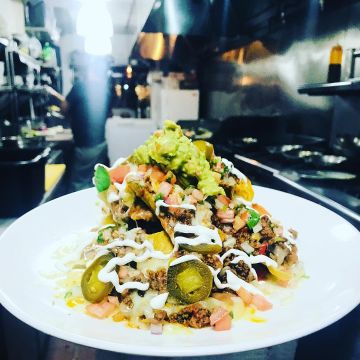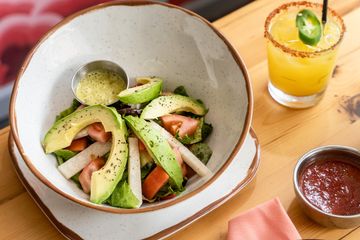Is Mexican Food Healthy And Balanced? Unpacking the Nutritional Perks of Traditional Active Ingredients
The inquiry of whether Mexican food is healthy welcomes an expedition of its conventional components. Beans and corn function as foundational staples, abundant in protein and fiber. Avocados give advantageous fats, while different natural herbs and flavors add flavor and health benefits - hand crafted margarita. Together, these parts produce a tapestry of nutrition. The healthfulness of Mexican cuisine frequently depends on prep work techniques and portion dimensions. What role do these elements play in determining its total nutritional worth?
The Power of Beans: Protein and Fiber-Rich Staples
Commonly forgotten, beans offer as a cornerstone of Mexican cuisine, offering a wide range of dietary advantages. Rich in healthy protein, they are an excellent plant-based alternative for those seeking to meet their nutritional protein needs. This high protein content sustains muscular tissue repair work and growth, making beans vital for both meat-eaters and vegetarians alike. In addition, beans are an extraordinary resource of nutritional fiber, which assists in digestion and promotes a feeling of volume, potentially helping with weight monitoring.
The variety of beans used in Mexican meals, such as black beans, pinto beans, and kidney beans, adds to a varied taste profile and can enhance dishes nutritionally. In addition, beans are low in fat and include necessary vitamins and minerals, including iron, magnesium, and folate. With each other, these attributes make beans an essential ingredient, supplying both nutrition and sustenance in traditional Mexican price.

Corn: a Versatile Grain With Nutritional Benefits
Corn sticks out as a functional grain essential to Mexican food, celebrated not just for its cooking applications however additionally for its remarkable dietary profile. As a primary ingredient in dishes like tortillas, tamales, and pozole, corn provides crucial nutrients that add to a balanced diet. Rich in carbs, it works as a significant power resource, while likewise being reduced in fat, making it a desirable choice for different dietary needs.
Corn is an excellent source of nutritional fiber, which aids in digestion and promotes satiation. It contains significant amounts of vitamins such as B-complex vitamins, which are vital for power metabolism. The existence of anti-oxidants, specifically carotenoids, adds to total health and wellness by minimizing oxidative tension. Additionally, corn is gluten-free, satisfying those with gluten sensitivities. On the whole, the nutritional benefits of corn highlight its significance in typical Mexican food and its role in a healthy diet.
Avocados: Healthy Fats and Nutrients in Every Bite
Avocados play a considerable duty in Mexican cuisine, matching recipes with their velvety texture and rich flavor. Beyond their cooking charm, avocados are commemorated for their impressive nutritional account. They are an abundant resource of healthy monounsaturated fats, which can aid reduced bad cholesterol levels and assistance heart health and wellness. In addition, avocados are packed with necessary nutrients, including potassium, vitamin E, and B vitamins, adding to total health.
The high fiber material in avocados aids digestion and promotes satiety, making them a valuable enhancement to any kind of dish. Their special nutrient composition can also support skin wellness and provide anti-inflammatory advantages. Including avocados right into traditional Mexican dishes or enjoying them as a standalone treat can improve both flavor and nutrition, showing why they are a precious staple in Mexican food. Generally, avocados supply a delicious method to take pleasure in healthy fats and important nutrients in every bite.

Herbs and seasonings: Flavorful Health Boosters
While delighting in the rich tastes of Mexican food, one can not overlook the vital role that spices and natural herbs play in improving both taste and wellness. Ingredients such as chili, cilantro, and oregano peppers not only add to the lively taste profile but also provide significant health advantages. Cilantro is recognized for its cleansing residential properties, aiding to remove heavy steels from the body, while oregano is loaded with antioxidants and possesses anti-inflammatory effects.
Chili peppers, a staple in lots of Mexican recipes, include capsaicin, visit the website which has been connected to boosted metabolic process and discomfort alleviation. Furthermore, spices like cumin and coriander assistance food digestion and might aid in blood sugar policy. Integrating these delicious health and wellness boosters into dishes not just enhances the cooking experience however likewise advertises general wellness, making Mexican food not just tasty, however likewise nutritionally beneficial.
Conventional Cooking Methods: Enhancing Nourishment and Flavor
Traditional food preparation methods in Mexican cuisine play a necessary function in improving both nutrition and flavor, as they frequently prioritize classic strategies and fresh components. Methods such as nixtamalization, where corn is soaked and prepared in an alkaline remedy, not just enhance the go nutrient profile of tortillas yet likewise improve their digestibility - New York Times rated. Additionally, the usage of slow cooking approaches, like cooking or braising, enables flavors to meld beautifully while retaining the integrity of the ingredients

Often Asked Concerns
Are Mexican Food Portions Commonly Larger Than Various Other Cuisines?
Mexican food portions are usually bigger than those of numerous other foods. This particular shows conventional eating methods, highlighting communal sharing and hearty dishes, which can result in an extra considerable serving dimension generally.
How Does the Prep Work Method Affect Healthfulness of Mexican Food?
Preparation techniques significantly influence the healthiness of gramercy tavern Mexican food. Strategies such as grilling or steaming protect nutrients, while frying can boost harmful fat web content. Options of active ingredients and cooking styles ultimately determine general dietary value.
Can Mexican Food Be Customized for Details Dietary Limitations?
Mexican food can certainly be customized for particular nutritional constraints. Replacements, such as making use of corn tortillas for gluten-free diets or incorporating even more veggies, enable individuals to enjoy standard flavors while fitting numerous nutritional demands.
What Are Usual False Impressions About Mexican Food and Health And Wellness?
Typical mistaken beliefs about Mexican food include the idea that it is inherently undesirable, extremely spicy, and solely focused on fats. In truth, conventional recipes usually include nutritious ingredients and can be customized to numerous nutritional needs.
Exist Healthier Choices at Mexican Restaurants?
Healthier alternatives at Mexican restaurants usually include barbequed meats, beans, and fresh veggies. Choosing recipes that highlight whole active ingredients and staying clear of hefty sauces can cause a much more nourishing eating experience, advertising overall well-being.
The range of beans utilized in Mexican dishes, such as black beans, pinto beans, and kidney beans, contributes to a varied flavor account and can boost dishes nutritionally. Avocados play a substantial role in Mexican cuisine, enhancing meals with their velvety texture and rich taste. Integrating avocados into typical Mexican dishes or enjoying them as a standalone treat can enhance both taste and nutrition, showing why they are a precious staple in Mexican cuisine. While taking pleasure in the rich flavors of Mexican cuisine, one can not ignore the crucial role that spices and herbs play in improving both preference and health and wellness. Standard cooking methods in Mexican cuisine play a vital duty in improving both nourishment and flavor, as they typically focus on fresh ingredients and time-honored strategies.